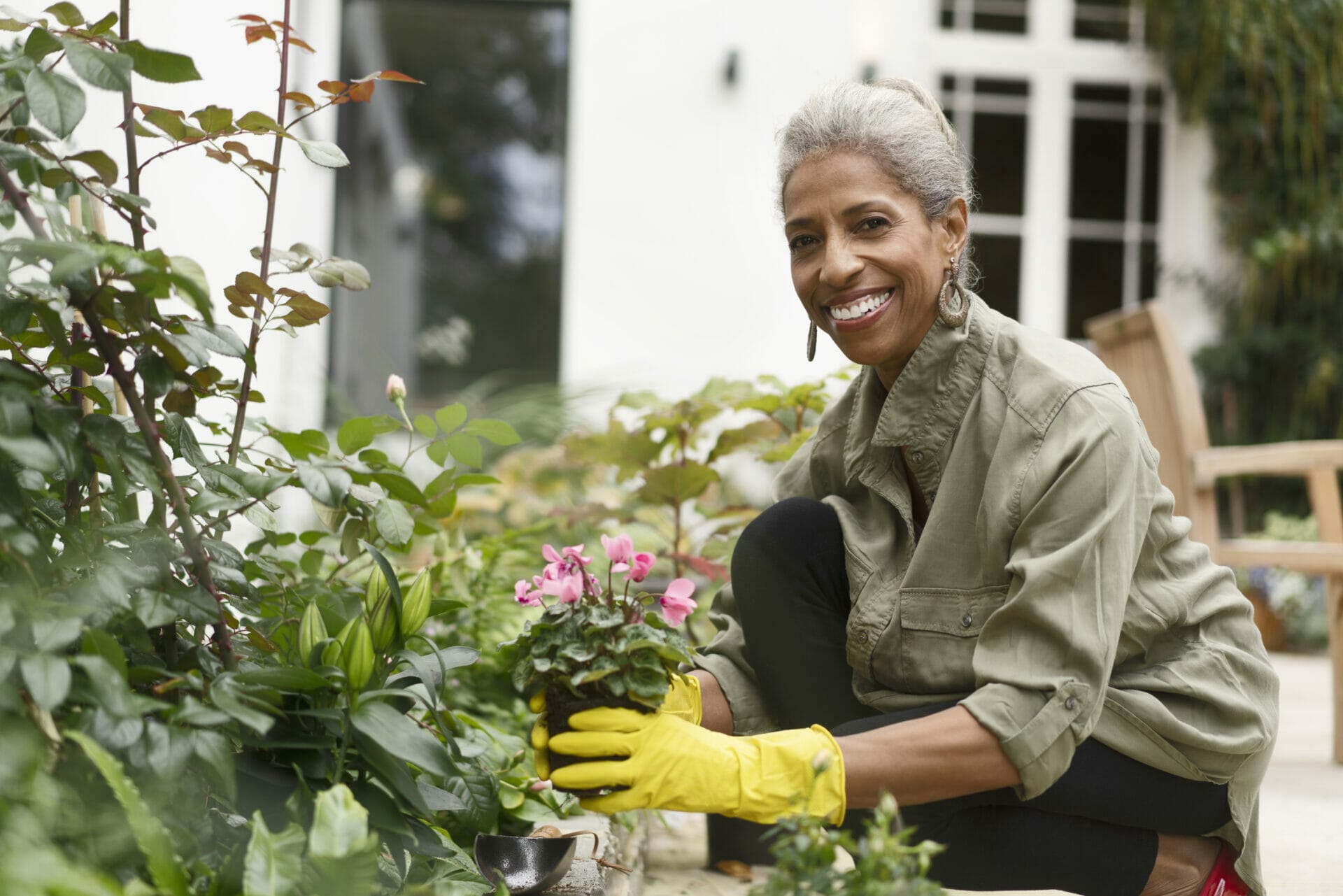Spending time in a garden can boost the body, mind and spirit. This is especially true for older adults who live in climates like Indiana’s where winter often keeps people cooped up indoors. Even if you only have a small outdoor area, it’s still possible to plant and tend a garden. It can be as simple as purchasing a few containers or installing raised flower beds in which to grow plants.
The health benefits of gardening make it worth the work it takes to get started. Nurturing a garden is linked to lower blood pressure, improved core strength and reduced stress. That’s in addition to the more obvious rewards—having fresh flowers or vegetables to enjoy all summer long.
Taking steps to stay safe while gardening is important for seniors. Fortunately, there are measures that can allow an older gardener to continue enjoying this popular pastime. Here’s what to know about everything from container gardens and raised beds to thoughtful design.
Container Gardening Tips for Seniors
Containers, as well as window boxes, make for easy-to-reach gardens. Resin or plastic-blend pots are lighter than concrete or terra cotta planters, making them a better option for seniors. Depending on your preference, you can grow many types of vegetables, herbs and flowers in containers. If you haven’t tried container gardening before, these tips might be of interest:
- Proper soil for your area: A thriving container garden begins with healthy soil. For containers, an organic material that retains water is best. Check with the staff at your local garden centers to see if they sell a region-specific mix.
- Good drainage: Proper drainage helps keep the roots of the plant from rotting. If your container lacks drainage holes and it’s not possible to add them, one easy workaround is to cover the bottom of the pot with a thin layer of stone or gravel.
- Careful plant choices: The plants you can use will depend on whether the containers will be located in sun, shade or both. A rule of thumb is to choose a taller flower or vegetable to catch the eye, a trailing plant or vine to spill over the edge and medium-sized plants to fill in. Gardeners refer to this approach as a thriller, a spiller and a filler.
Another option to consider if you are an older gardener is an elevated or raised garden bed. They are readily available at online garden websites and in local home improvement stores.
Elevated Garden Beds
Older gardeners often find the safety and convenience of raised garden beds to be a good solution for them. If you decide to go that route, a few factors to keep in mind are:
- Sunlight: If you are fortunate to have several places in the yard where you could install raised beds, think about what you want to plant in them. You’ll have to keep the sun factor in mind as you select your plants. While you might love the cheerfulness of geraniums or the delicacy of a snapdragon, it’s important to match your plant choices with the amount of sun each part of your garden receives.
- Soil depth: In general, raised beds should be deep enough to allow a gardener to fill them with 6–12 inches of dirt. In hotter climates, you will likely need more soil to allow roots to stay cooler. Combining topsoil with coconut coir (for drainage) and compost often works best in elevated garden beds. It’s also helpful to finish off the raised bed with a layer of mulch to prevent flowers and vegetables from drying out so quickly.
- Drainage: Like container gardens, raised beds require good drainage. If the raised garden beds you install don’t have drainage holes, be sure to drill some. A layer of crushed stone or pea gravel along the bottom of the bed may also help.
One more tip to keep in mind is that a raised bed or container garden typically needs more water than plants sown directly into the ground. On hot, humid days, a gardener might even need to water twice.
Senior-Friendly Garden Tips
Whatever type of garden a senior opts to plant, it’s important to make sure it’s located near water. Dragging around hoses can be tough at any age, but for older adults, it can also present a fall risk. If it’s not possible to locate the garden in easy reach of water spigots, consider installing drip irrigation hoses. These systems are a safe and efficient solution that can be especially helpful to senior gardeners.
A few more suggestions to consider are:
- Place benches or chairs to rest on throughout the garden. That’s beneficial to any gardener but to older adults in particular.
- Try to plant flowers, vegetables and herbs that are native to your area and climate. That makes maintenance easier.
- Select plants that don’t require deadheading or frequent feeding. That also makes maintaining the garden less work.
Finally, remind yourself and the senior gardeners in your life to be mindful of hydration basics. Carry water in an insulated, non-breakable bottle. Wearing sunscreen and a hat that shields the face can also help prevent dehydration.
Check out the Anew Home Health Blog and Learn More
We invite you to visit our blog center to read more articles from Anew Home Health. To learn more about Anew Care visit AnewCare.com.

